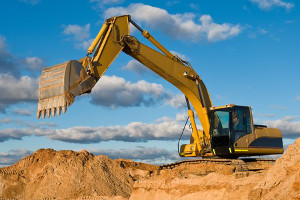
Are you a property owner in Northern Virginia preparing to embark on a construction project? Whether you’re building a new home, tearing down an existing structure to make way for a fresh build, or adding an extension to your current property, proper site preparation is a crucial first step. This process involves key tasks such as clearing trees, rough grading, and site staking to ensure your land is ready for foundation work, plumbing installations, and other customized features based on your design plans.
As a property owner who values active involvement in the building process, it’s essential to gain an understanding of the fundamentals of site preparation. This includes recognizing the common pitfalls that can occur during the process—mistakes that even seasoned contractors can make. Below, we’ll cover three of the most common errors contractors make during site preparation and provide tips on how to avoid them.
Why Site Preparation is Important
Site preparation is more than just clearing and leveling land—it’s about creating a stable, safe, and reliable environment for construction. Poorly prepared sites can lead to foundation issues, structural instability, drainage problems, and costly repairs down the road. Proper planning and execution ensure that your construction project begins on the right track and saves both time and money. However, achieving this requires an understanding of the process and awareness of the potential problems that could arise.
Common Mistakes Contractors Make During Site Preparation
1. Lack of Planning
One of the most common mistakes during site preparation is failing to plan adequately. No two construction sites are alike; each has its own unique slope, soil composition, topography, and challenges. Even the most experienced contractor cannot assume that previous methods will work seamlessly at a new site.
The absence of proper planning often leads to inefficiency and wasted resources. For example, a contractor who shows up with the wrong equipment or lacks a clear strategy can quickly derail the timeline of your project. A reputable construction team should visit your site beforehand, conduct a comprehensive consultation, and assess the specific needs of your property before starting work.
What You Can Do:
As the homeowner, make sure you insist on a site visit and consultation before hiring a contractor. During this consultation, ask detailed questions about their approach to your unique property. Will they perform soil tests, analyze drainage patterns, or assess elevation levels? These steps indicate a contractor who values thorough planning.
2. Complacency Among Workers
 Complacency can be a silent productivity killer. For construction companies, it can translate to sloppy work, cutting corners, and overlooking critical issues. Workers who are disengaged or unsatisfied may exhibit lazy habits, such as improperly maintaining equipment, ignoring wear and tear signs, or performing subpar tasks.
Complacency can be a silent productivity killer. For construction companies, it can translate to sloppy work, cutting corners, and overlooking critical issues. Workers who are disengaged or unsatisfied may exhibit lazy habits, such as improperly maintaining equipment, ignoring wear and tear signs, or performing subpar tasks.
Poorly motivated workers not only risk damaging expensive machinery but could also jeopardize the safety and quality of your project. For homeowners, this complacency might not always be noticeable until problems arise later during construction or after the building is completed. A precise and careful approach to clearing, grading, or excavation is critical for site preparation—but it depends heavily on the diligence of the team involved.
What You Can Do:
When meeting with contractors, pay attention to their work culture, attitude, and enthusiasm. A motivated and knowledgeable workforce is a sign of a company that invests in its employees, ensuring they take pride in their work and execute tasks to a high standard.
3. Poor Time Management
Another mistake frequently encountered during site preparation is poor time management. This issue often stems from inadequate planning and arises when contractors fail to estimate realistic deadlines. Sometimes individuals or teams may give overly optimistic timelines to secure a contract, only to later underdeliver due to unforeseen circumstances.
Poor time management can have far-reaching effects, including delays in the overall construction process and increased costs. Equipment rental fees, additional labor hours, and even financing costs can accumulate when a project falls behind schedule.
What You Can Do:
When hiring a contractor, discuss deadlines early on and ensure they are based on careful analysis and realistic expectations. Ask them to walk you through potential challenges that could impact the timeline, such as bad weather, soil inconsistencies, or unexpected materials requirements.
Demolition and Excavation: Specialized Skills for Site Preparation
If your site preparation involves tearing down an existing structure or digging for a new foundation, working with skilled demolition and excavation specialists is a must. Here’s why these processes are critical to the site preparation phase:
What to Look for When Choosing Demolition and Excavation Specialists
Well-Maintained Equipment
Reliable machinery is essential for quality work. Equipment that appears rusty, outdated, or poorly maintained should be a red flag when evaluating contractors. Machines used for demolition and excavation require regular maintenance to ensure they function efficiently and safely.
Trained Workers
The operators of demolition and excavation equipment play a significant role in project success. Skilled professionals know how to tackle challenges like uneven terrain, buried utilities, or unstable ground with precision.
Attention to Detail
Look for contractors with a meticulous approach to preparing the site. Every step—whether it’s demolishing old foundations, uprooting trees, or ensuring proper drainage—matters in creating a strong base for future construction.
Types of Demolition and Excavation
Understanding the type of work required for your project is also critical when selecting a contractor. Demolition and excavation are not merely about moving earth and breaking structures; they involve detailed techniques based on the type of site and project goals. Common types include:
- Residential Demolition: Tearing down houses or structures for new builds or extensions.
- Commercial Demolition: Removing large structures like warehouses or commercial buildings.
- Landscaping or Property Enhancement: Clearing areas for gardens, ponds, or outdoor features.
- Municipal or Environmental Projects: Demolishing unsound structures or preparing land while adhering to environmental guidelines.
Additional Considerations for Successful Site Preparation
To maximize the success of your site preparation efforts, consider these additional factors:
Drainage Planning
 Proactive drainage management ensures water does not pool around the structure’s foundation after construction. This requires rough grading to create a slight slope directing water away from the property.
Proactive drainage management ensures water does not pool around the structure’s foundation after construction. This requires rough grading to create a slight slope directing water away from the property.
Erosion Control
If your site preparation involves significant earth movement, use erosion control measures like silt fences, sediment basins, or vegetation planting. This minimizes environmental damage and keeps soil stable throughout the project.
Permits and Regulations
Check with your local municipal offices or homeowners’ associations to confirm all necessary permits and compliance with zoning laws are in place before site preparation begins.
Soil Quality
Soil characteristics can dramatically affect construction. For example, stable fill dirt is required for grading and foundation work, while nutrient-rich topsoil is better suited for landscaping purposes.
Partner with Our Experienced Site Preparation Professionals
Proper site preparation is crucial for setting the tone of your construction project and avoiding costly mistakes. As construction begins, the quality of site preparation impacts not only the functionality of the new property but also its durability and long-term value.
If you’re ready to start a construction project in the Northern Virginia area, connect with trusted site preparation professionals like Dirt Connections. With expertise in demolition, excavation, and dirt delivery, Dirt Connections ensures your project begins with a solid foundation. Whether you’re grading land, clearing a site, or preparing for a new structure, choosing the right partner is key to a successful outcome.
Contact Dirt Connections today for reliable service and a consultation to ensure your site preparation needs are met efficiently and effectively. Don’t leave your property’s future to chance—start with the right team for the job








































